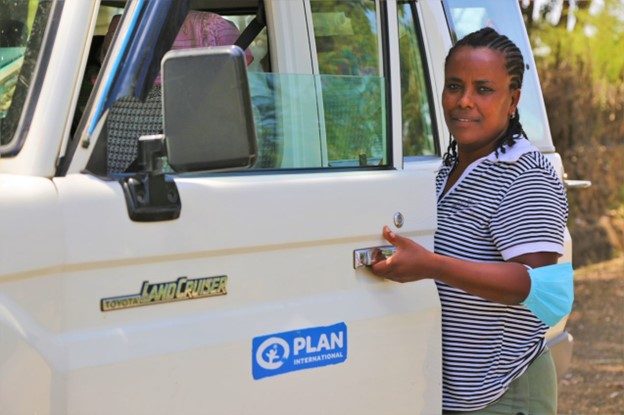A blog by Dr Unni Krishnan, Global Humanitarian Director, Plan International.

Some people and some faces never fade from our memories, especially people we meet them in crisis.
Last October, when hunger was unfolding rapidly in Ethiopia, I had the honour of travelling with Aynalem Bizuayehu. Aynalem has been working with Plan International in the Amhara region for over 10 years. Her work is both unique and critical: she is a member of our frontline team responding to the hunger crisis. Aynalem told me that she always wanted to help children.
Every day she moves our teams and relief materials to where their support is needed most, most of the time hard to reach and remote villages. There are days she travels over 400km across all terrains and in all weather. The hunger crisis and the conflict have only made her work more challenging, and her days longer. Without her contribution, there is no movement for our relief teams and materials.
World Humanitarian Day
August 19 is World Humanitarian Day, a global celebration of people helping people.
This day was designated in memory of the 19 August 2003 bomb attack on the Canal Hotel in Baghdad, Iraq, killing 22 people.
It is a moment to recognise the amazing work of humanitarians like Aynalem. It is also a moment to reflect on the big idea of humanity and the three guiding stars at the core of humanitarian action: compassion, solidarity, and pragmatism.
“We are one humanity and as such, we must support each other.”
Dr. Unni Krishnan, Global Humanitarian Director, Plan International.
These are universal values at the heart of our shared human experience: I have seen them in action across borders, embodied by people of all ages, genders, religions and backgrounds, all guided by a steadfast belief that we are one humanity and as such, we must support each other.
Compassion is our first guiding star to advance humanity in crisis settings. Without compassion, which literally means ‘suffering together,’ we would not be able to put ourselves into each other’s shoes, or see a crisis through the eyes of a child. Every day, humanitarian workers make the world a more caring and compassionate place by putting other people first: for them, the human call is loud and clear. This gives me hope.
Solidarity comes next. Countless times I have seen solidarity shape into a collective force to do good. Solidarity does not always have to be heroic: sometimes, it can mean giving voice to the powerless, protesting injustice, or not letting others suffer alone. Other times, it can make the difference between life and death.The world is living through an unprecedented hunger crisis with millions of children going to bed hungry every night – a crisis made worse because of conflicts, climate breakdown and the fallout of the COVID-19 pandemic.
And yet, we have seen bursts of solidarity in the form of coordinated assistance to refugees with governments opening borders and ordinary people opening their hearts and homes. I am thinking of Turkey, Colombia, Uganda, Pakistan, Germany and Poland – some of the countries hosting the largest number of refugees. It is a simple truth that we have more in common that binds us as a single humanity than our differences. When we open ourselves and our borders to others, it has the power to create magic.
The third guiding star of humanitarian work is pragmatism. It is there to provide a mindset and solid anchor to compassion and solidarity; it is also what enables us to ‘make things happen’. In wars, disasters and emergencies, there are a hundred jobs to be done, and it is natural that we may get paralysed.
For example, in a cholera outbreak setting, dehydration can kill a child in six hours. A battle against dehydration is often a race against time. Neither blind optimism or eternal pessimism helps- instead, pragmatism and a ‘possibilist’ approach quick decisions and momentum can often stop a cholera outbreak in its tracks.
Aynalem’s main concerns were the practical challenges of a driver- a flat tyre or fuel shortage.
It takes a village to tackle a crisis
Caring and supporting people who are caught up in wars, disasters and disease outbreaks is not something any single team or organisation can do on their own—it often takes a village, perhaps the whole of humanity to make a meaningful difference in crisis settings.
Everyone has a role to play in such settings –drivers, nurses, teachers, nutritionists, mental health and protection experts, communicators, artists, logisticians, security advisors and translators and all the other anonymous superheroes amongst us. We are all part of the same ‘village’—and no single role is less important than the other.
The world’s ability to respond to disasters and wars has always depended on local people, who are the first responders during an emergency. Over the last couple of years, while living through a pandemic, lockdowns, and travel bans, we have also learned that sometimes local volunteers are the only responders.
For every crisis in the spotlight, there are several underreported and underfunded emergencies. And for every high-profile humanitarian professional, there are thousands of humanitarians like Aynalem – ordinary people who became “superheroes” when they found themselves amid a crisis.
They are on the ground rolling up their sleeves, setting up a community kitchen, temporary school or a safe place for children, transporting relief workers or materials, or digging deep into the rubble to rescue people with their bare hands after an earthquake or missile strikes.
Thanks to them, the world is a safer, more just, compassionate, and caring place.


